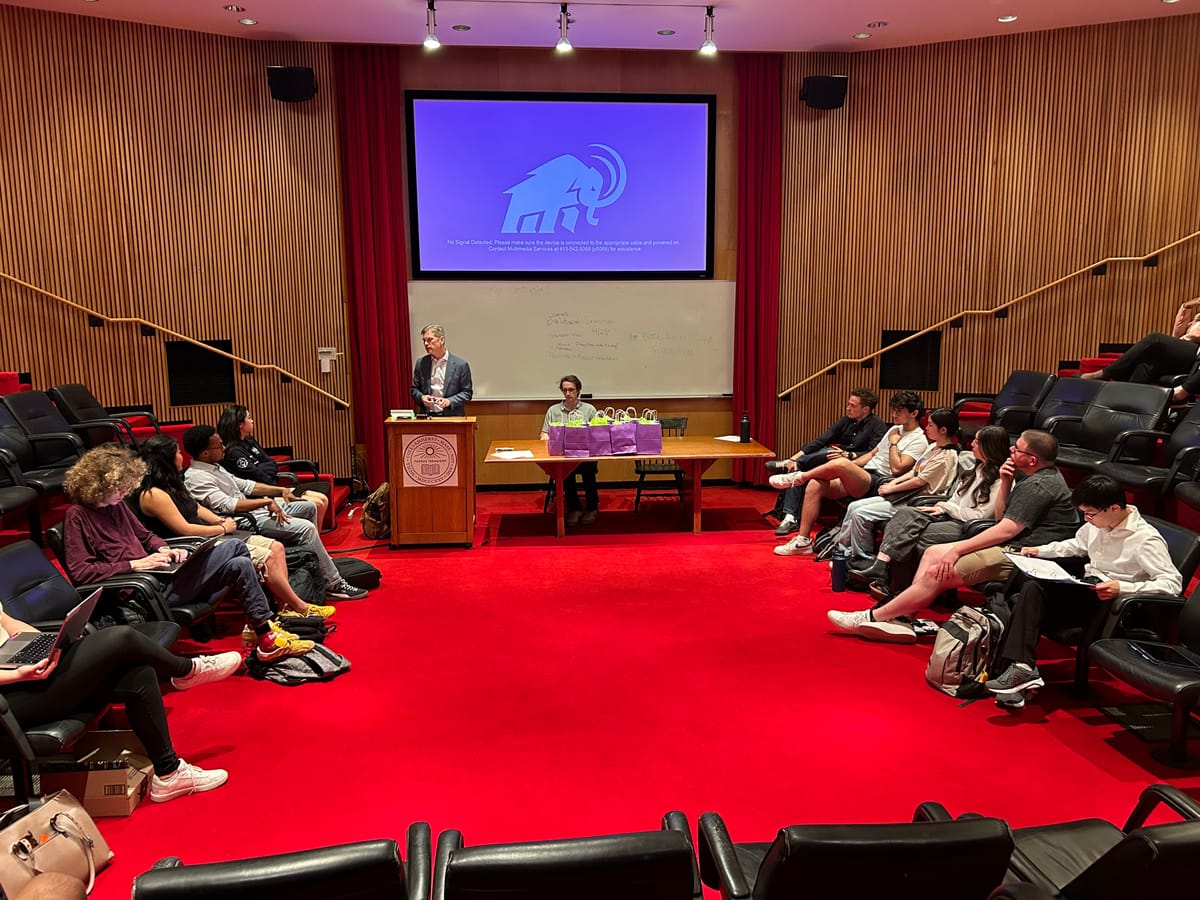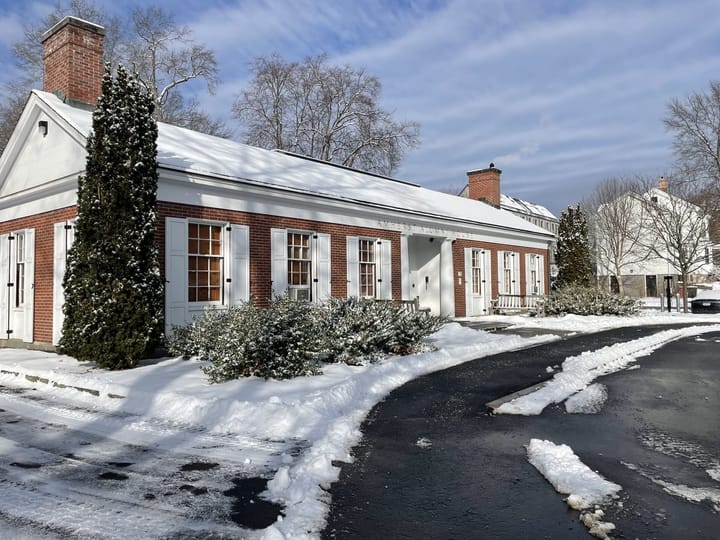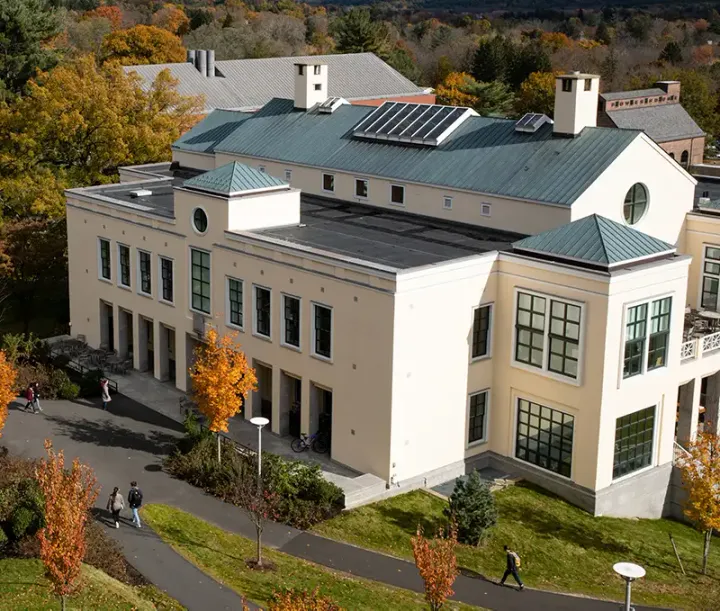Elliott Outlines Priorities at “State of the College” Address
President Michael Elliott delivered his annual “State of the College” address at the AAS’ weekly meeting on Monday. Elliott discussed the pressure the college currently faces from the federal government while emphasizing the values he would like to see in the Amherst community.

President Michael Elliott and members of the Amherst Association of Students (AAS) executive board delivered “State of the College” addresses on Monday, reflecting on the past year of upheaval on campus while offering advice for students returning to Amherst in the years to come.
A string of remarks from each outgoing member of the AAS executive board preceded Elliott’s address. The senate leaders reflected on the role of student government within the college generally, while Elliott assessed the most significant challenges currently facing Amherst and outlined his hopes for the school’s culture going forward.
Gent Malushaga ’25, the departing AAS president, discussed his takeaways from his time at the helm of AAS, concluding that the true influence of the senate at Amherst lay less in its actual power than in its ability to collaborate productively with the administration.
“We can’t make anyone do anything. What we can do is leverage relationships,” he said. “What makes us powerful and what gives our role substance is our positioning between the college and the student body.”
Taking the stage after the executive board members had finished their farewell speeches, Elliott spoke to a number of pressing concerns the college has faced over the past year.
Notably, Elliott claimed that the large drop in the percentage of Black students in this year’s freshman class was something that he bore personal responsibility for.
“It was something that I thought we had a handle on, and we obviously did not,” he said. “We're committed to doing better, and I think we will in the very near future.”
Elliott also offered his support to various groups on campus that may feel vulnerable in the midst of the Trump presidency, especially international and immigrant students.
“I want to stress that I don’t actually see immigration as a partisan issue, because for me, it’s in Amherst College's mission to recruit the best talent … from all over the world,” he said. “Anything that makes it harder to do that is in direct contradiction to our mission.”
Lastly, Elliott addressed the attacks on higher education emanating from the Trump administration, and admitted that “when I read the demand letters that were made at Harvard and Columbia, I have to imagine that we could see some demands of this kind sometime landing on our doorstep.”
Yet, Elliott affirmed the college’s commitment to a core set of values centering on academic freedom, institutional autonomy, and the “capacity to support students regardless of their background.”
Elliott focused the rest of his address on the status of the college’s culture, emphasizing not only the aspects he feels are being threatened by actions from the federal government, but also the current areas he feels proud of, as well as some he would like to see growth in.
To begin, Elliott praised “the strength of student leadership and how it’s growing” at the college. Aside from just the senate, which he said “feels so much stronger than it was three years ago.” He also cited the college’s new Mammoth Leadership Academy, which he stated will “build real dividends over time.”
Next, Elliott discussed his appreciation for the way Amherst students “come together and try to lean into difficult questions.” Referencing discussions on campus over the past year on issues related to the war in Gaza, Elliott said he has been impressed by the civility with which students engage each other.
“It’s sometimes so hard for me to speak to people from beyond the campus, because they assume that there’s a level of vitriol and harassment among students that I just never saw on this campus,” he said. “Even though I didn’t necessarily agree with everything that everybody was saying, you treated each other well and with respect, and that’s something of which you should be proud.”
It was here that Elliott stated his goal for the college community to align with the values of “confident pluralism,” outlined by the political scientist Danielle Allen, the James Bryant Conant University Professor at Harvard University.
“It’s a community where people can cultivate disagreement, where they not just have the right to speak, but where they actively listen to one another, and where they respect one another as equals,” he said.
Elliott said he feels this type of mutual respect is threatened by social media apps such as Fizz, of which he stated he was “not a fan.”
“Anonymous speech over social media creates real opportunity to abandon the kind of respect that I think should be the bedrock of a community like this one,” he said.
Elliott also counseled students not to allow the challenges and uncertainty facing the nation at the moment to corrode the campus community.
“Forces that prey on uncertainty and fear also look to sow division,” he said. “While we certainly have to make room for disagreement, we can’t let them divide us. We can’t fall prey to the kind of cheap discourse of blame that I think is too often what substitutes for commentary in the United States.”
As Elliott ruminated on the campus community he would like to see at Amherst, he mentioned his favorite memory from the past academic year: the Amherst Got Talent show.
“I was at the back of the powerhouse. It was packed. The energy was incredible. The acts were terrific,” he said. “There was a short lyric opera about William Henry Harrison and dinosaurs, which that itself alone, I would have stood in line for at least an hour for.”
Elliott, who said “there’s so much noise right now about college. About how it’s just woke nonsense, and we’re indoctrinating you,” stated he wished “every member of the current cabinet in the presidential administration could have been in that room to see what real diversity looks like and what it can achieve together.”
“I think it would have changed their lives and rocked their world,” he said. “It didn’t do that for them, but it did for me. So thank you.”





Comments ()